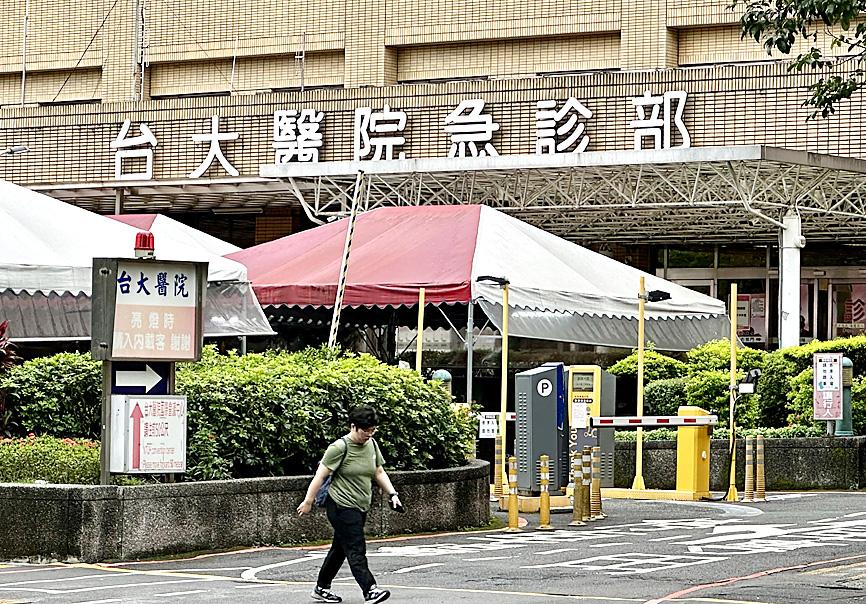Last year cancer was the leading cause of death in Taipei for the 51st consecutive year, while COVID-19 became the third most common cause of death in the city, the Taipei Department of Health said yesterday.
The department said 21,047 Taipei residents died last year, which is an increase of 2,395 people (12.8 percent) compared with the year before, while the mortality rate was 841 deaths per 100,000 people, which is 113.4 deaths (15.6 percent) more than the year before.
The growth rates of deaths and mortality were the highest on record.

Photo: Lo Pei-de, Taipei Times
They were mainly affected by the COVID-19 outbreak and aging population, it said.
Among the 10 leading causes of death in Taipei, cancer was followed by heart disease, COVID-19 infection, pneumonia, cerebrovascular disease, chronic lower respiratory disease, diabetes, hypertensive disease, kidney disease and vascular or unspecified dementia.
Deaths from the 10 leading causes accounted for 76.7 percent of all deaths in the city last year, and eight among the leading causes were chronic diseases, accounting for 62.4 percent of all the deaths in the city, it said.
The number of deaths due to cancer, pneumonia and cerebrovascular disease have slightly decreased last year, while deaths due to the other seven causes increased, and among them, COVID-19-related deaths increased by 1,287 people, which is 3.8 times of that from the year before, the department’s data show.
About 82.9 percent of the total deaths were of elderly people aged 65 or older, and of the COVID-19 related deaths, 90.2 percent were aged 65 or older.
The Taipei Department of Health’s Statistics Office Director Fan Ju-hsin (范汝欣) said that COVID-19 leaped from the 11th leading cause of death to the third leading cause of death last year, and that the city’s COVID-19 mortality rate was 65.1 deaths per 100,000 people, slightly higher than the nation’s COVID-19 mortality of 62.9 deaths per 100,000 people.
The high COVID-19 mortality rate could be explained by Taipei’s higher number of elderly residents — the second highest percentage of elderly in its population in the nation, she said, adding that the data also did not distinguish between the influence levels of different factors, such as those who died of COVID-19 and might also have had cancer, but were counted among the COVID-19-related deaths.
In other news, the Centers for Disease Control (CDC) yesterday denied Taiwan People’s Party (TPP) Chairman Ko Wen-je’s (柯文哲) claim on Sunday about the government having received more donated COVID-19 vaccines than it purchased.
The CDC said Taiwan began purchasing COVID-19 vaccines in September 2020, and received vaccines donated by Taiwan Semiconductor Manufacturing Co (台積電), Hon Hai Precision Industry Co-affiliated Yonglin Foundation, the Buddhist Compassion Relief Tzu Chi Foundation, as well as the governments of the US, Japan, Lithuania, the Czech Republic, Poland and Slovakia.
As of the end of last month, Taiwan had received a total of 92.675 million doses of vaccines — 68.41 million doses purchased by the government and 24.265 million doses donated by the countries and agencies — it said, adding that the government had purchased 73.8 percent of the vaccine doses.
Additional reporting by CNA

Trips for more than 100,000 international and domestic air travelers could be disrupted as China launches a military exercise around Taiwan today, Taiwan’s Civil Aviation Administration (CAA) said yesterday. The exercise could affect nearly 900 flights scheduled to enter the Taipei Flight Information Region (FIR) during the exercise window, it added. A notice issued by the Chinese Civil Aviation Administration showed there would be seven temporary zones around the Taiwan Strait which would be used for live-fire exercises, lasting from 8am to 6pm today. All aircraft are prohibited from entering during exercise, it says. Taipei FIR has 14 international air routes and

Taiwan lacks effective and cost-efficient armaments to intercept rockets, making the planned “T-Dome” interception system necessary, two experts said on Tuesday. The concerns were raised after China’s military fired two waves of rockets during live-fire drills around Taiwan on Tuesday, part of two-day exercises code-named “Justice Mission 2025.” The first wave involved 17 rockets launched at 9am from Pingtan in China’s Fujian Province, according to Lieutenant General Hsieh Jih-sheng (謝日升) of the Office of the Deputy Chief of the General Staff for Intelligence at the Ministry of National Defense. Those rockets landed 70 nautical miles (129.6km) northeast of Keelung without flying over Taiwan,

City buses in Taipei and New Taipei City, as well as the Taipei MRT, would on Saturday begin accepting QR code payments from five electronic payment providers, the Taipei Department of Transportation said yesterday. The new option would allow passengers to use the “transportation QR code” feature from EasyWallet, iPass Money, iCash Pay, Jkopay or PXPay Plus. Passengers should open their preferred electronic payment app, select the “transportation code” — not the regular payment code — unlock it, and scan the code at ticket readers or gates, General Planning Division Director-General Liu Kuo-chu (劉國著) said. People should move through the

The Ministry of National Defense (MND) today released images of the military tracking China’s People's Liberation Army (PLA) movements during the latest round of Chinese drills around Taiwan. The PLA began "Justice Mission 2025" drills today, carrying out live-fire drills, simulated strikes on land and maritime targets, and exercises to blockade the nation's main ports. The exercises are to continue tomorrow, with the PLA announcing sea and air space restrictions for five zones around Taiwan for 10 hours starting from 8:30am. The ministry today released images showing a Chinese J-16 fighter jet tracked by a F-16V Block 20 jet and the